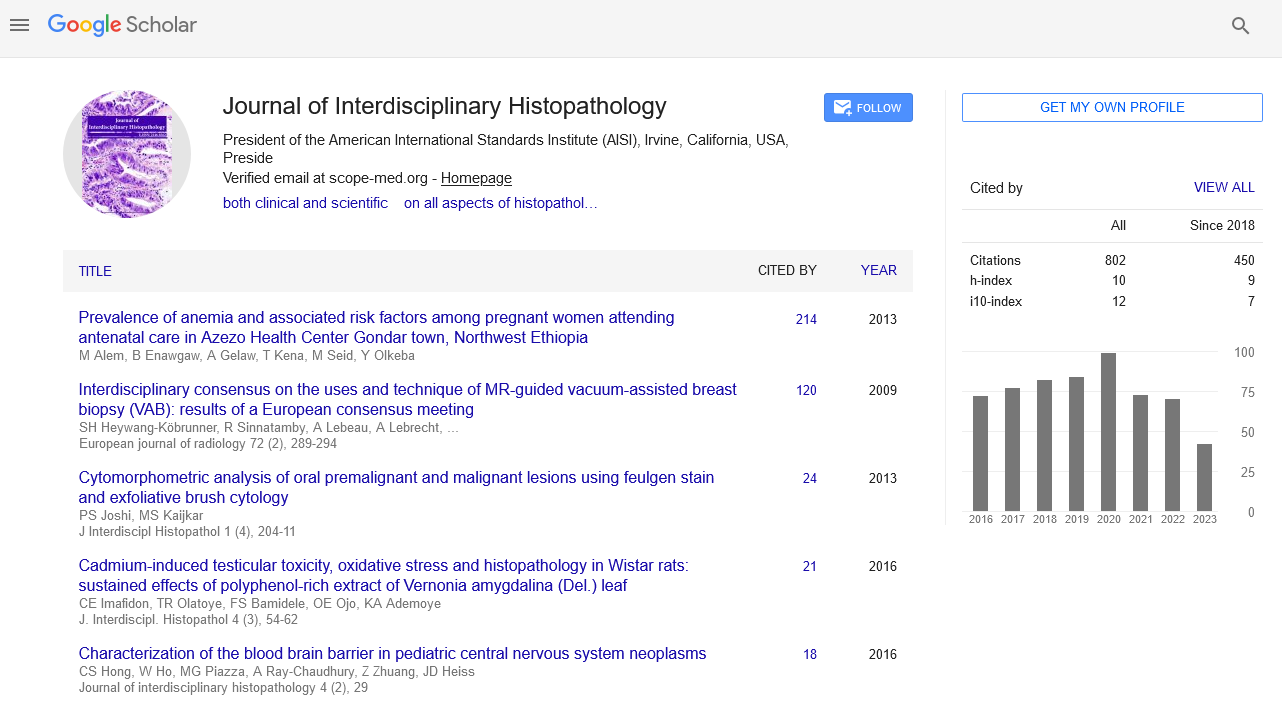Opinion - Journal of Interdisciplinary Histopathology (2024)
The Molecular Revolution in Diagnosis and Transforming Pediatric Healthcare
Gaiman Kazuo*Gaiman Kazuo, Department of Pathology, University of Rhode Island, Kingston, USA, Email: gaka.muo_90@edu.org
Received: 12-Feb-2024, Manuscript No. EJMJIH-24-135218; Editor assigned: 15-Feb-2024, Pre QC No. EJMJIH-24-135218(PQ); Reviewed: 01-Mar-2024, QC No. EJMJIH-24-135218; Revised: 08-Mar-2024, Manuscript No. EJMJIH-24-135218(R); Published: 15-Mar-2024
About the Study
In the field of pediatric medicine, advancements are continually sought to enhance our ability to diagnose and understand diseases affecting children. The advent of molecular-level technologies has sparked a revolution in pediatric diagnostics, offering profound insights into disease mechanisms and paving the way for targeted therapies. This essay explores the transformative impact of molecular diagnostics on pediatric healthcare, delving into its applications and implications.
Decoding disease mechanisms
At the molecular level, diseases manifest through intricate biological processes. Molecular diagnostics enable us to resolve these mechanisms with unprecedented precision. By analyzing genetic mutations, aberrant protein expression, and metabolic imbalances, clinicians can pinpoint the root causes of pediatric illnesses. This deeper understanding facilitates more accurate diagnoses and tailored treatment strategies, ultimately improving patient outcomes.
Precision medicine in pediatrics
One of the most potential applications of molecular diagnostics is the advent of precision medicine in pediatrics. Rather than employing a one-size-fits-all approach, precision medicine tailors treatments to the unique genetic makeup and molecular profiles of individual patients. This paradigm shift holds immense potential for children with rare or complex diseases, offering targeted therapies that bypass the trial-and-error approach of traditional treatments.
Early detection and intervention
Early detection is important in pediatric medicine, where timely interventions can significantly alter disease trajectories. Molecular diagnostics empower clinicians to identify diseases at their earliest stages, sometimes even before symptoms manifest. From genetic screening for hereditary conditions to detecting circulating biomarkers indicative of disease onset, these techniques offer unprecedented opportunities for early intervention and improved prognoses.
Personalized prognostics and risk assessment
Understanding the molecular underpinnings of pediatric diseases not only aids in diagnosis and treatment but also enables personalized prognostics and risk assessment. By analyzing genetic markers and molecular signatures, clinicians can predict disease progression, anticipate complications, and tailor follow-up care accordingly. This proactive approach enhances patient management and empowers families with valuable insights into their child’s health trajectory.
Enhancing research and development
Molecular diagnostics also play a pivotal role in driving research and development efforts aimed at pediatric diseases. By elucidating disease mechanisms and identifying molecular targets, these technologies accelerate the discovery of novel therapies and interventions. Furthermore, molecular profiling facilitates the stratification of patient populations for clinical trials, ensuring that experimental treatments are tested on those most likely to benefit.
Challenges and ethical considerations
Despite their transformative potential, molecular diagnostics pose certain challenges and ethical considerations in pediatric healthcare. Issues such as the interpretation of genetic data, privacy concerns surrounding genomic information, and disparities in access to cutting-edge technologies must be addressed to ensure equitable and ethical implementation. Moreover, the psychosocial implications of genetic testing on children and their families warrant careful consideration and support.
In molecular diagnostics have revolutionized our capacity to diagnose and comprehend pediatric diseases, ushering in a new era of precision medicine and personalized care. From deciphering disease mechanisms to enabling early detection and intervention, these technologies offer unparalleled insights into pediatric health. However, realizing the full potential of molecular diagnostics requires addressing challenges and ethical considerations while prioritizing equity and inclusivity in pediatric healthcare. As continue to harness the power of molecular-level insights, move closer to a future where every child receives the tailored care that deserve.






